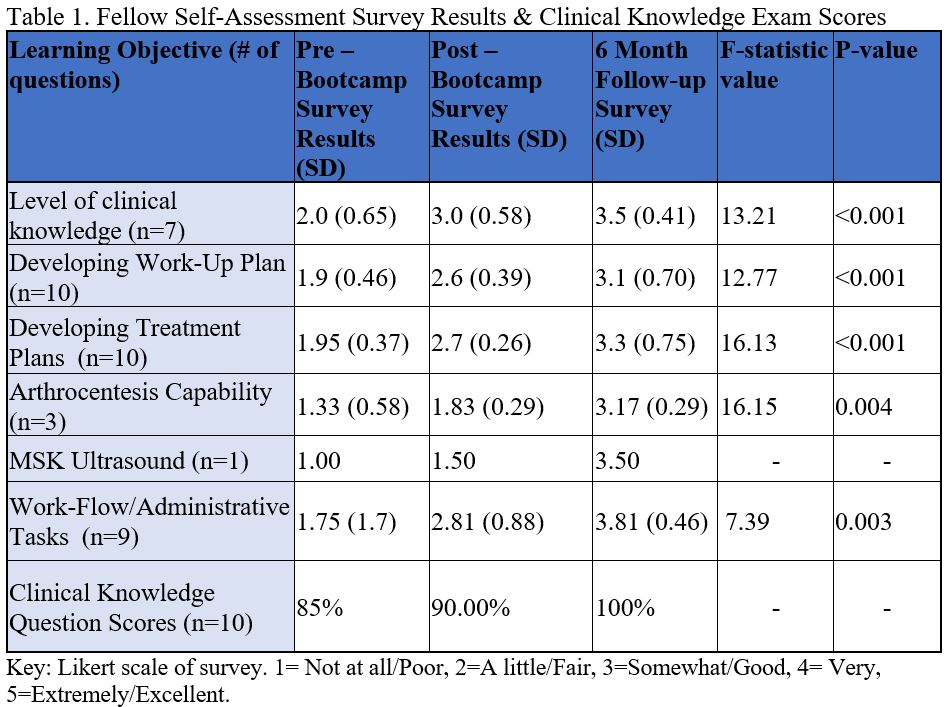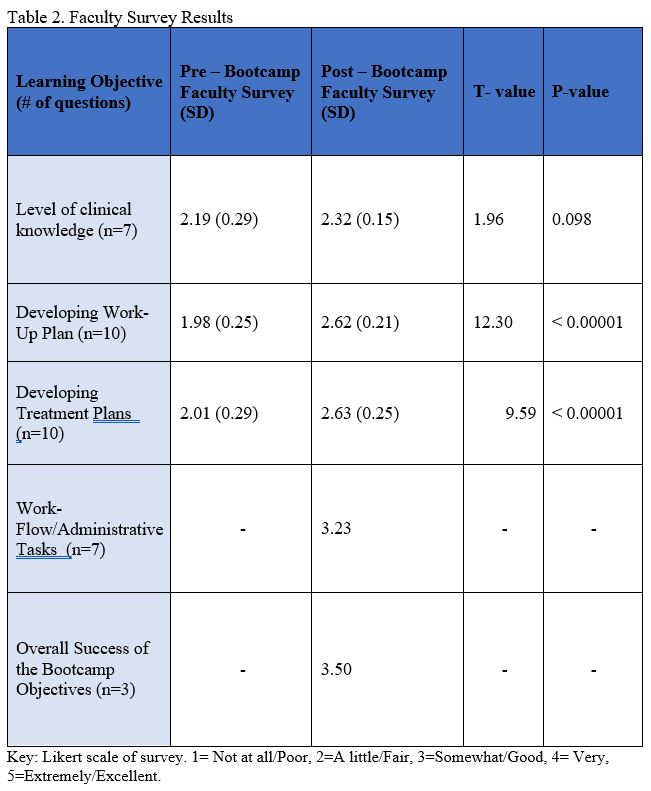Session Information
Session Type: Poster Session C
Session Time: 9:00AM-11:00AM
Background/Purpose: Transitions in medical education, such as the matriculation from residency to fellowship, can be a challenging experience with increased knowledge expectations in new clinical settings. Despite the growing number of transition courses, or “bootcamps,” there remains a paucity of medical education research, a leaning towards virtual programs, and no published orientation curricula for subspecialized training in rheumatology. We compared the effect of a near-peer rheumatology fellowship bootcamp on new fellows’ self-assessments before, after, and 6 months following our intervention along with fellows’ clinical knowledge exam scores and performance evaluations by faculty.
Methods: We designed a 3-day intensive, interactive, multi-modality curriculum that included near-peer senior fellow led introductory sessions, workspace tour, and workflow workshops. In addition, incoming fellows were exposed to hands-on SIM center physical exam teaching skills, MSK ultrasound introduction, injection teaching, and disease specific didactic sessions. The 2 junior rheumatology fellows were then assessed with a pre-, post-, and 6-month follow-up 46 question survey. Rheumatology faculty completed a 20-question survey comparing consecutive year fellows who did not complete a bootcamp to those who did. 10 clinical knowledge questions on basic concepts in rheumatology were administered to the fellows with each survey.
Results: With 46 survey questions grouped into learning objectives, we compared self-assessed comfort in: Level of clinical knowledge (n=7), Developing work-up plans (n=10), Developing treatment plans (n=10), Arthrocentesis capability (n=3), MSK ultrasound (n=1), and Workflow/administrative tasks (n=9; Table 1). We found that the bootcamp increased fellow level of confidence in all proposed learning objectives, and improvement continued at the 6-month follow-up retention of knowledge survey. The pre-bootcamp clinical knowledge mean exam score was 85%, improved to 90% on the post-bootcamp exam, and ultimately 100% correct at the 6 month follow up. Post intervention, the faculty survey discovered that our junior fellows were better equipped to develop a work-up plan (p< 0.00001) and treatment plan (p< 0.00001; Table 2). Faculty assessed the success in introducing high yield concepts between “good” and “very” with a score of 3.4 on a 5-point Likert scale. A secondary objective of comparing the creation of working relationships between faculty and new fellows was graded as 3.7.
Conclusion: This innovative University of Wisconsin rheumatology fellowship bootcamp represents the first published iteration for a near-peer led rheumatology curriculum. Distinctively, this curriculum included simulation center actors, a hands-on course on arthrocentesis and dedicated senior fellow led clinical setting workshops and tour. The fellow-led teaching model further consolidates the knowledge in senior fellows. Future directions include expansion of the bootcamp to prospectively collect baseline data and increase the sample size.
To cite this abstract in AMA style:
Donohue S, Lin T, Levinson J. Creation and Dissemination of a Near-Peer Rheumatology Fellowship Bootcamp [abstract]. Arthritis Rheumatol. 2023; 75 (suppl 9). https://acrabstracts.org/abstract/creation-and-dissemination-of-a-near-peer-rheumatology-fellowship-bootcamp/. Accessed .« Back to ACR Convergence 2023
ACR Meeting Abstracts - https://acrabstracts.org/abstract/creation-and-dissemination-of-a-near-peer-rheumatology-fellowship-bootcamp/


